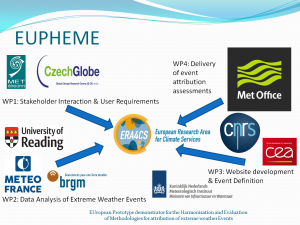Extreme weather events occur across the majority of Europe on an annual basis. Some of these hazardous weather events also occur in Ireland. Such events include heat waves during the summer months or very cold temperatures over a period of time during the winter. Others include heavy and persistent rainfall which leads to flooding. Or the opposite can occur, where a lack of rainfall can lead to drought situations. Some people feel that these extreme weather events are increasing in frequency and intensity, and that one of the main causes for this is human-induced climate change. It is very important that this connection between extreme weather events and climate change is better understood. Another name for such a link is climate change attribution i.e. how extreme weather can be attributed to climate change.

EUPHEME members
It is important to understand how human-induced climate change affects extreme weather and by how much. This is the aim of the EUPHEME (European Prototype demonstrator for the Harmonisation and Evaluation of Methodologies for attribution of extreme weather Events) Project. Further information can be found on the following website: http://www.jpi-climate.eu/nl/25223456-EUPHEME.html. This project is funded by the EU Commission.
Several organisations across Europe are involved in the EUPHEME project, with each partner organisation looking at a different component of the work. The University of Reading, Météo France and the BRGM (The French Geological Survey) will conduct an analysis of selected extreme weather events and investigate how much of a role climate change played in each of these past weather events. They are using statistical tools in their climate change attribution analyses. One of these notable events is Storm Ophelia which affected Ireland in October 2017. The CNRS – the French National Centre for Scientific Research, the CEA (The French Alternative Energies and Atomic Energy Commission) and the KNMI – the Dutch Meteorological Service will develop a website where results and data analysis will be displayed. The UK Met Office is the organisation at the heart of the project. They will liaise with all other organisations and prepare climate change attribution assessments which will be included on the new website.
Met Éireann and a company from the Czech Republic called the CGCRI (CzechGlobe Global Change Research Institute) will investigate how extreme weather events affect the general public, private companies, governmental departments, city councils and energy companies, to name a few. We will be focusing on Ireland and the United Kingdom, providing a Western Europe perspective, while the CGCRI will look at Central Europe. As weather impacts a vast array of people and groups, this list will be quite extensive. The information that is gathered from our stakeholders in the early stages of our research is very important for the overall development of the EUPHEME project. Any information collected will help shape the development of the website and highlight what weather information needs to be the focus of the research.
Many positive benefits are expected from the EUPHEME project including an increased awareness of extreme weather and a better understanding of the rate of change of occurrence of extreme weather events which will enable better planning and provision of services for the people of Ireland and Europe.